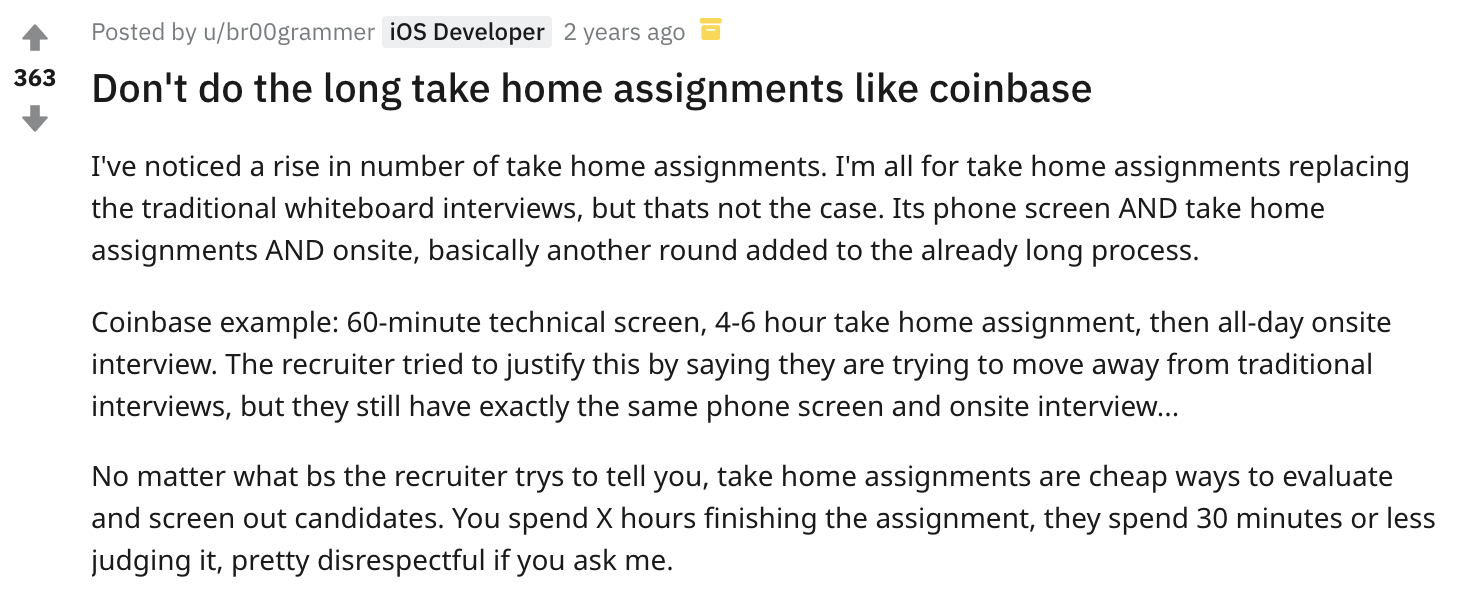7 Reasons Your Recruitment Process Sucks
Interviewers often say that they use these questions to "see how a candidate thinks", or "see if they can think out of the box", or "see how they think under pressure" or some excuse of that sort. This claim isn't backed by research.


1. Lack of clarity/ communication about the hiring process
Most companies globally are guilty of not being clear and upfront with candidates about what the hiring process will look like. If you are figuring out the hiring process as you go, you're doing it wrong. While it is okay to be flexible depending on circumstances, you should have a game plan of what the hiring process looks like, and what steps are involved. You should also let the candidates know upfront what to expect, how to prepare and how long the process will be.
2. Puzzles
Another sin a lot of companies are guilty of, is to ask questions for the sake of tricking candidates.
Interviewers often say that they use these questions to "see how a candidate thinks", or "see if they can think out of the box", or "see how they think under pressure" or some excuse of that sort. This claim isn't backed by research.
Apparently, Google conducted a study to check if asking puzzles in interviews was useful, and the results were such that they stopped using puzzles altogether.
"On the hiring side, we found that brainteasers are a complete waste of time."
According to Laszlo Bock, senior vice president for people operations at Google:
"They don’t predict anything. They serve primarily to make the interviewer feel smart."
Easy fix
Ask your interviewers/ hiring managers to stick to questions that test for on-the-job ability or cultural fit. Puzzles serve no purpose other than making the interviewer feel smart.
3. Unreasonably long take home assignments


Given that companies are seeing an unprecented number of applications for their open roles, it is becoming common for prospective employers to ask applicants to complete a take home project as part of the hiring process.
While a take home assignment can be a great way to weed out unqualified candidates, recruitment teams need to keep in mind that candidates are busy. The best candidates very likely are currently in a full-time job and are considering multiple opportunities in parallel. While serious applicants might consider a take home assignment if it is short and involves an interesting problem, most good candidates will reject unreasonably long assignments.
Easy fix
See if it possible to replace the take home assignment with a skills assessment or an interview, If you have to use a take home assignment, make sure to keep the following in mind:
- Keep it short (1-3 hours). If for some reason, you need to use an assignment that take 10+ hours of work on the candidate's part, send it only to shortlisted candidates that you strongly intend to consider and compensate them for their time.
- Ask your hiring managers to create a short document explaining exactly what they expect, and what they will evaluate the assignment submission.
- Move fast once they submit. If you like their work, give them an interview in the next available slot. If you don't, let me know what was missing and how they could have done better.
4. Sleazy interviewers
It is not okay to show up late/ not show up. The candidate's time is just as precious as yours. It is not okay to yawn, check your phone or browse the internet during the interview.
Easy fix
Make sure all interviewers are well prepared, have researched the questions they will ask. If it is their first time interviewing candidates, ask them to shadow other interviews for a couple of weeks first, before they start conducting interviews themselves.
5. Terribly long processes

Consider these stats revealed by a Robert Half study:
- 23% candidates lose interest in a company if they don’t hear back within 1 week after the initial interview; and 46% lose interest if there’s no update 1-2 weeks post the interview.
- When faced with a lengthy hiring process, 39% of survey respondents lose interest and pursue other opportunities.
This is interesting, given that in 2017, the average length of the hiring process was 23.8 days. The risk of making a bad hire causes organizations to add redundancy to the hiring process, and wait longer until they make a hire/ no-hire decision.
Companies face a tradeoff between being cautious to avoid a bad hire and filling vacant positions as quickly as possible. While it is always good to be careful, lengthy hiring processes risk losing top candidates to the competition.
Easy fix
There isn't an easy fix to this. But if your hiring process is long, and there is no way to move things faster atleast be sure to maintain constant communication with the candidate to keep their interest alive.
6. Ghosting/ lack of rejection letters
The vast majority of companies never respond. Companies ghost candidates at multiple stages in the recruitment process- right after the application, after a pre-screening call, after the candidate completes a pre-employment test or a take home assignment or post interviews. While it is understandable that you do not want to spend your time sending a rejection email to the candidate who never wrote a single line of code and applied to your software engineer role because why not, you can automate rejection emails. Just because some candidates are not respectful of your time, does not mean you can be disrespectful of the time of genuine candidates. Especially if the candidate has spent time going through part of your hiring process like a phone interview or a skills assessment, you need to make the effort to let them know you will not be proceeding with their application.
Easy fix
It takes all of 10 minutes to set up a standard rejection email from a template, costs nothing and candidates will be extremely grateful to you for the gesture. You can set up your ATS system to send an automated rejection email as soon as you have decided not to proceed with the candidate. While it is best to share personalized feedback, even an templated rejection email is highly appreciated.
7. Yes/ no/ maybe/ give us 3 weeks? 2 more weeks?
An indecisive hiring team is one of the worst experience for a candidate, because it leaves them in a limbo, making it difficult for them to figure out next steps and might also cause them to miss out on other opportunities.
Regularly check in with candidates you're considering to make sure that they’re having a good experience. If they’re not, you're doing something wrong.
Easy fix
Decide quickly. If you can't decide on something, the answer is no.

